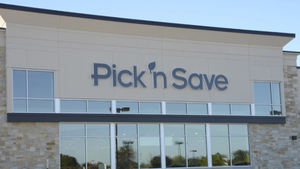FTC STUDY: SUPERMARKETSCANNING IS MOST PRECISE
WASHINGTON (FNS) -- A Federal Trade Commission study issued last week said price scanning at supermarkets showed fewer errors than at other types of retailers.For supermarket operators, the FTC study counters a widely held perception among consumers that supermarket scanning is inaccurate, resulting in frequent overcharges.According to the study, supermarkets err 3.47% of the time when ringing up
October 28, 1996
JOANNA RAMEY
WASHINGTON (FNS) -- A Federal Trade Commission study issued last week said price scanning at supermarkets showed fewer errors than at other types of retailers.
For supermarket operators, the FTC study counters a widely held perception among consumers that supermarket scanning is inaccurate, resulting in frequent overcharges.
According to the study, supermarkets err 3.47% of the time when ringing up purchases. Of those mistakes, 1.92% are overcharges and 1.55% are undercharges.
The FTC undertook the study after receiving numerous complaints from shoppers about the veracity of retail computer scanners, which have widely replaced manual tallying of prices with cash registers.
Overall, the study found that scanned prices don't match the shelf or sale prices for goods 5% of the time, compared with a 16% error rate for prices manually entered into a cash register. The study was conducted over an 18-month period and involved 17,298 items purchased.
Discount stores -- including supercenters and warehouse clubs -- made scanner mistakes 4.56% the time, the second-lowest error rate in the study. Of those errors, 1.87% were overcharges, and 2.68% were undercharges.
Home goods stores had the third-lowest error rate, 5.36%. Drug stores were next in line with an error rate of 6.31%, of which 2.75% were undercharges and 3.56% were overcharges. Department stores were fifth, with the largest error rate, at 9.15%, of which 5.9% were undercharges and 3.25% were overcharges.
Jodie Bernstein, director of FTC's Bureau of Consumer Protection, said the report conveys two messages: Consumers aren't being widely cheated by technology and, because of the undercharges, retailers are missing out on potentially millions of dollars in sales.
"They are losing money," Bernstein said at a news conference. She declined to estimate how much retailers are actually losing from undercharging, typically a result of human error by not properly recording prices in the scanner system.
Bernstein attributed the low supermarket error rate to the fact the industry was one of the first to use the technology, in place since the 1970s, and therefore has developed efficient systems to properly record prices.
The FTC study should put to rest claims that supermarket scanning is undependable, according to Tom Zaucha, president of the National Grocers Association, Reston, Va. "We've known all along that supermarket operators are making a good-faith effort to guarantee the consumer accurate pricing," Zaucha said.
Tim Hammonds, president and chief executive officer of the Food Marketing Institute, Washington, noted that the study underscores the efficiency and reliability of scanner systems.
"This is important evidence that scanning technology benefits consumers."
John Block, president of Food Distributors International, Falls Church, Va., agreed that the study shows that scanning bar codes instead of manually entering prices of goods has helped shoppers. "This report certainly attests to the value of automated checkout systems vs. manual checking."
Under the FTC study, the frequency of scanner mistakes at the 388 supermarkets checked occurred more with nonfood items than with food. The same held true with the dollar value of the mistakes.
Overcharges occurred 115 times on food items, for a total amount of $60.47, and 273 times on nonfood products, for a total of $1,112. Undercharges occurred 93 times on food items, totaling $70.30, while customers were undercharged 353 times for nonfood goods, amounting to $1,249.37.
For all the retailers checked, $1.319 million in undercharges were registered, compared with $1.172 million in overcharges.
About the Author
You May Also Like




